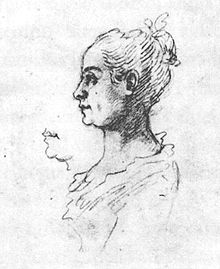- Didone abbandonata (Sarro)
-
 The final scene in Metastasio's libretto, Didone Abandonata, by Cecilio Rizzardini
The final scene in Metastasio's libretto, Didone Abandonata, by Cecilio Rizzardini
Didone abbandonata (Dido Abandoned) is an opera in three acts composed by Domenico Sarro to a libretto by Pietro Metastasio, which was based on the story of Dido and Aeneas from the fourth book of Virgil's Aeneid. The opera premiered on 1 February 1724 at the Teatro San Bartolomeo in Naples.
Contents
Background and performance history
Didone abbandonata was Metastasio's first original libretto, and Sarro's opera was the first of what were to be over fifty musical settings of the work. The opera premiered at the Teatro San Bartolomeo in Naples on 1 February 1724 along with a two-part comic intermezzo also composed by Sarro to a libretto by Metastasio, L'impresario delle Canarie.[1] Didone abbandonata was Sarro's sixteenth opera composed for the theatres in Naples and is considered an important example of his mature style.[2]
The title role was sung in the premiere by Marianna Bulgarelli, famed for her talent as an actress. Bulgarelli was also the patron and mistress of the young Metastasio, who was living in her home while he wrote Didone. He intended it as a showcase for her, and according to contemporary accounts, Bulgarelli had considerable influence on the work, especially in shaping Dido's scenes of jealousy in Act 2.[3] Marianna Bulgarelli and her Aeneas, Nicolo Grimaldi, reprised their roles on 26 December 1724 at the Teatro San Cassiano in Venice for the premiere of Tommaso Albinoni's setting of the libretto, and again on 10 May 1725 in Reggio Emilia for the premiere of Nicola Porpora's setting.[3]
The premiere of Sarro's Didone was very successful, with contemporary accounts reporting the audience deeply moved.[4] The opera was given a second run later that year at the Teatro San Bartolomeo and played in several other opera houses in Italy. Sarro revised the opera (with a text adapted from Metastasio's by Giovanni Boldini) for its Venice premiere on 24 November 1730 at the Teatro San Giovanni Grisostomo. On that occasion, Nicolo Grimaldi again sang the role of Aeneas, but Didone was sung by Lucia Facchinelli. The revised version was dedicated to Gustavus Hamilton, 2nd Viscount Boyne who was in the audience that night.[5] The opera was also performed in Brno in the autumn of 1734,[6] and its revival at the Teatro San Bartolomeo in 1737 was the theatre's last opera performance before it gave way to the newly built Teatro San Carlo.[7]
Eventually Sarro's opera fell into obscurity and there are no recordings of the complete work. However, on 23 September 2005, a shortened concert version was performed at the Schloss Elisabethenburg in Meiningen by the ensemble Les Amis de Philippe conducted by Ludger Rémy, a live recording of which was broadcast on MDR radio the following year. Several copies of the manuscript score are held in the San Pietro a Majella conservatory in Naples.
Roles
Role Voice type Premiere cast[8]
1 February 1724Didone, Dido, queen of Carthage, in love with Enea soprano Marianna Bulgarelli Enea, Aeneas, a Trojan hero alto castrato Nicolo Grimaldi Iarba, Iarbas king of the Moors, who appears as "Arbace" contralto Antonia Margherita Merighi Selene, sister of Dido and secretly in love with Aeneas soprano Benedetta Sorosina Araspe, confidant of Iarba and lover of Selene tenor Annibale Pio Fabri Osmida, confidant of Dido contralto Caterina Levi Synopsis
- Setting: Ancient Carthage
Dido (Didone), Queen of Carthage, had been promised in marriage to King Iarbas (Iarba), but fell in love with the Trojan warrior Aeneas (Enea), who had been shipwrecked on the shores of her city. Iarbas appears disguised as "Arbace" to warn Dido that Aeneas cannot become King of Carthage. Nevertheless Dido refuses to marry Iarbas. Although Aeneas is now in love with Dido, he asks her sister Selene to tell her of his plans to leave Carthage for Italy. War then breaks out between Aeneas and Iarbas in which the Trojan is triumphant. After his victory, Dido convinces Aeneas to remain in Carthage and become her husband. But when the ghost of Aeneas' father reminds him of his duty to his people, Aeneas realises that he must abandon Dido. Heartbroken, she commits suicide as Aeneas and his men set sail for Italy.
Notes and references
- ^ Casaglia (2005). L'impresario delle Canarie is also known by several other names: Dorina e Nibbio, L'impresario, L'impresario e la cantante, and The Master of the Opera
- ^ Robinson
- ^ a b Markstrom (2007) p. 146
- ^ "La Marianna sotto l' aspetto dell' infelice Didone, e Niccolò Grimaldi sotto quello d' Enea vi fecero tali prodigi, e commossero si fattamente ogni cuore, che in Napoli i più vecchi parlano ancora al presente delle lagrime espresse in quella occasione." Metastasio et al (1791) pp. xx-xxi
- ^ Selfridge-Field (2007) p. 420
- ^ Freeman (1992) p. 185
- ^ Heslin (2005) p. 39
- ^ Premiere cast from Casaglia (2005)
Sources
- Casaglia, Gherardo, "1 Febbraio 1724", Almanacco Amadeus, 2005. Accessed 28 December 2009.
- Freeman, Daniel E., The opera theater of Count Franz Anton von Sporck in Prague, Pendragon Press, 1992. ISBN 0945193173
- Gelli, Piero (ed.), "Didone abbandonata", Dizionario dell'Opera, Baldini Castoldi Dalai, 2007, ISBN 8860731844. Accessed online 26 December 2009.
- Heslin, P.J., The Transvestite Achilles: Gender and Genre in Statius' Achilleid, Cambridge University Press, 2005. ISBN 0521851459
- Markstrom, Kurt Sven, The operas of Leonardo Vinci, Napoletano, Pendragon Press, 2007. ISBN 1576470946
- Metastasio, Pietro, et al. Opere del Signor abate Pietro Metastasio: Con dissertazioni, osservazioni e citazione Volume 1, Giovanni Franchelli, 1791
- Robinson, Michael. "Sarri [Sarro], Domenico Natale", Grove Music Online, ed. L. Macy (accessed 27 December 2009), grovemusic.com (subscription access).
- Selfridge-Field, Eleanor, A new chronology of Venetian opera and related genres, 1660-1760, Stanford University Press, 2007. ISBN 0804744378
External links
Categories:- Italian-language operas
- 1724 operas
- Operas
- Operas by Domenico Sarro
Wikimedia Foundation. 2010.

